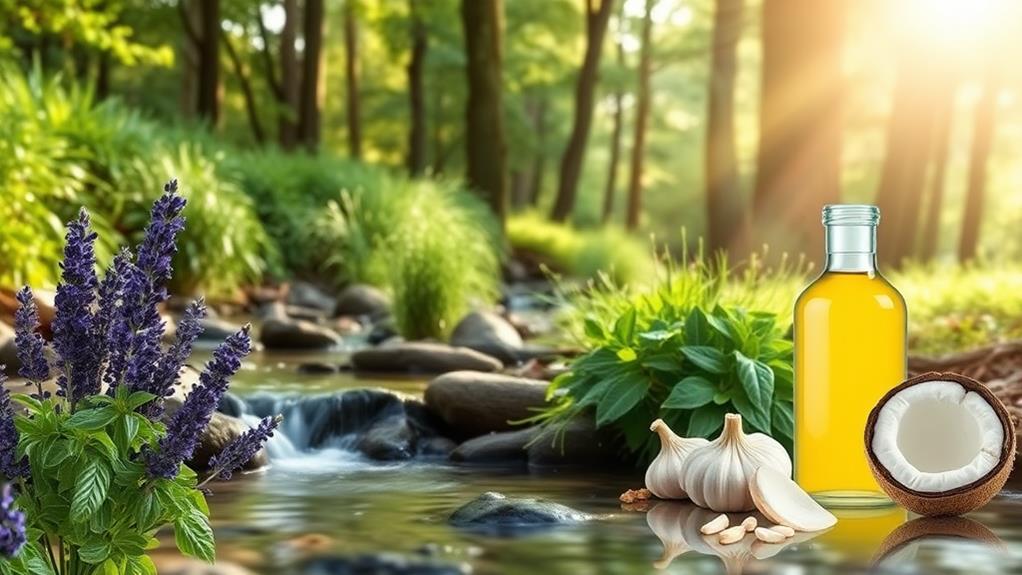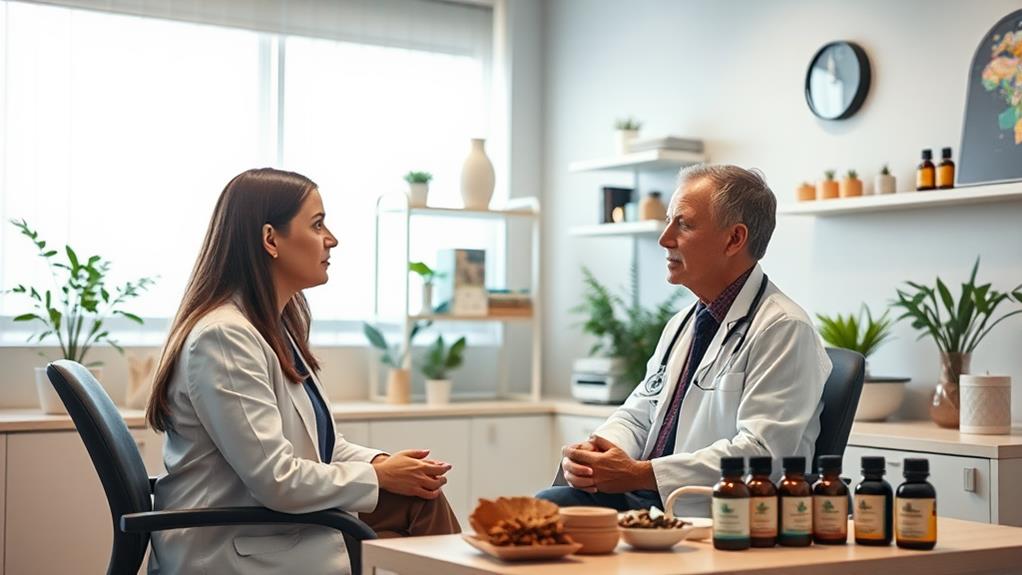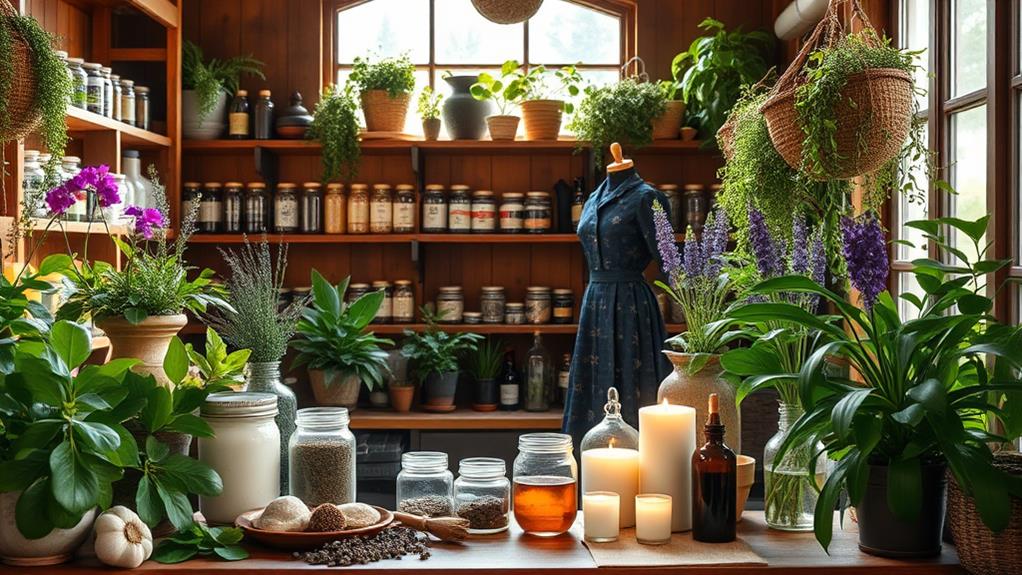When you're dealing with a yeast infection, exploring natural remedies can often lead to effective relief. You might find that ingredients like garlic and coconut oil not only soothe discomfort but also help combat the infection itself. Adjusting your diet and incorporating probiotic-rich foods can further strengthen your body's defenses. However, it's crucial to understand the broader context of these remedies and how they fit into your overall health strategy. There's more to reflect on that could make a significant difference in your healing journey.
Understanding Yeast Infections

Yeast infections can be uncomfortable and often catch you off guard. They usually happen when too much yeast, a tiny fungus, grows in places it shouldn't, like your mouth or down below. Your body has yeast all the time, but sometimes things like stress, antibiotics, or even a diet high in sugar can cause it to go out of control.
You might notice symptoms like itching, burning, or a thick, white discharge that looks a bit like cottage cheese. Not the most appetizing image, right? But don't worry; yeast infections are common and can happen to anyone, not just you.
Your body has its own ways of dealing with yeast, but sometimes it needs a little help. It's important to pay attention to your body's signals. If you think you might've an infection, don't hesitate to reach out to a healthcare professional.
They can give you the best advice on how to tackle the issue. Remember, you're not alone in this; many people deal with yeast infections, and understanding what's happening is the first step to feeling better!
Natural Remedies to Consider
When dealing with a yeast infection, you might want to explore some natural remedies that can provide relief. One popular option is a good old garlic clove. Garlic has antifungal properties, so you can try eating it or even using it topically. Just be careful not to go overboard; nobody wants to smell like a pizza!
Another remedy to contemplate is coconut oil. This magical oil not only moisturizes but also has antifungal qualities. You can apply it directly to the affected area, and it'll feel soothing, too. Plus, who doesn't love the tropical scent?
Tea tree oil is another contender. It's known for its powerful antifungal features. Just remember to dilute it with a carrier oil before applying, as it can be strong on its own.
You might also want to look into probiotics. These little guys help balance your body's natural flora, which can be helpful during a yeast infection. Yogurt containing live cultures is a tasty way to get your probiotics.
Dietary Changes for Prevention

Making smart dietary choices can play an essential role in preventing yeast infections. You mightn't realize it, but what you eat can really impact your body's balance.
First, try to limit sugary foods and drinks. Yeast loves sugar, and when you indulge, you're basically giving it a party invitation! Instead, focus on whole foods like fruits, vegetables, whole grains, and lean proteins. These foods keep your immune system strong and help maintain a healthy balance of bacteria and yeast.
Probiotics are another hero in your diet. Foods like yogurt, kefir, and sauerkraut are packed with good bacteria that help fight off the bad guys. You might even want to contemplate adding a probiotic supplement if you're not getting enough from food.
Also, don't forget to stay hydrated! Drinking plenty of water helps flush out toxins and keeps everything running smoothly.
Finally, if you love bread, opt for whole grain instead of white. It's not just healthier; it's tastier too!
Lifestyle Modifications for Healing
Adopting healthy lifestyle modifications can greatly aid in healing yeast infections.
First off, let's talk about hygiene. Keeping the affected area clean and dry is super important. Moisture can give yeast a cozy home, and we don't want that! Try wearing breathable cotton underwear and avoid tight-fitting clothes, which can trap moisture.
Next, let's get moving! Regular exercise not only boosts your mood but also strengthens your immune system, helping your body fight off infections. Just think of it as giving your body a little pep talk!
You should also manage stress. High stress can mess with your immune system, making it harder for you to heal. Try fun activities like yoga, meditation, or even a good book to unwind.
And remember to stay hydrated! Drinking enough water helps flush out toxins, giving your body the support it needs.
Lastly, don't forget about sleep. Getting enough rest is essential, as it allows your body to heal and recharge. So, grab your favorite pajamas and cozy up!
When to Seek Medical Advice

Recognizing the signs that you need medical advice is essential for effective treatment of yeast infections. If you notice that your symptoms don't improve after a few days of home remedies, it might be time to call in the pros.
When things get itchy or uncomfortable, we often think, "I can handle this!" But if the discomfort gets worse, don't be a hero—seek help!
It's also important to consult a doctor if you experience unusual symptoms, like fever or chills, or if your discharge has an odd color or smell. These could be signs that something else is going on.
If you've had more than four yeast infections in a year, your doctor might want to dig deeper to find the root cause.
And hey, if you're pregnant or have a weakened immune system, it's always best to check with a healthcare professional. They can provide guidance tailored just for you.
Remember, it's better to be safe than sorry! Your health is super important, and getting the right care can make all the difference in your healing journey.
